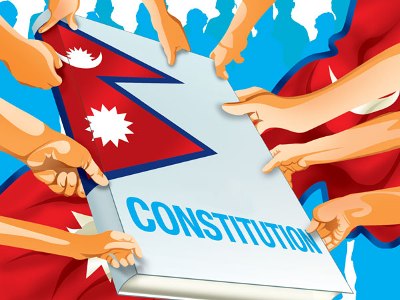Amendment for greater acceptability or effectiveness of the Constitution?
 Manoj Karki / Kathmandu: Nepal celebrated the first anniversary of the Constitution of Nepal, the first constitution, among seven so far, to have been drafted by the people’s representatives through the Constituent Assembly on September 19/20.
Manoj Karki / Kathmandu: Nepal celebrated the first anniversary of the Constitution of Nepal, the first constitution, among seven so far, to have been drafted by the people’s representatives through the Constituent Assembly on September 19/20.
The celebrations however drew varied feelings with contradictory scenes across the country. The ruling parties i.e. the government side, after announcing a three-day celebration including a public holiday, gathered at the Army Pavilion, a ceremonial location for customary celebrations of national days and occasions. While a section of the people, including those who claim of representing the Madhesis and Janajatis gathered in small pockets in various parts of the country including at Maitighar in the capital to what they called to observe a ‘black day’ in the history of Nepal.
Just a few meters ahead near the Parliament building that also hosted the then Constituent Assembly, Nepali Janata Dal-Rajabadi held a corner meet the same day calling for reinstatement of the 1990 Constitution including a constitutional monarch.
These varied scenes contradictory to one another reflected the challenging days ahead for the latest constitution of the country, drafted through a Constituent Assembly that the Nepali people longed for more than six decades. And it may be noted that the Constitution has already been amended once to address the concerns of the agitating Madhes-centric and Janajati groups. And there is a call and preparations for amending the constitution again.
However, unlike the first instance amendment to the national charter this time around seems difficult, with the main opposition CPN-UML and its current ally RPP-Nepal strongly opposing it. RPP-Nepal has even gone a step further demanding that if the constitution is to be amended at the behest of some groups, then it should also address the long-standing demand of the party to reinstate Nepal as a Hindu kingdom. The party has long been demanding that the matter of secularism and monarchy be dealt with through a referendum.
Meanwhile, Prime Minister Pushpa Kamal Dahal’s signing of a 25-point agreement, during his recent India visit, which called for the need to make Nepal’s constitution more inclusive and acceptable, has further alienated the opposition parties, who have argued that such a statement was in fact a direct interference into Nepal’s internal affairs.
The opposition parties have also raised serious objection over the Nepal-India joint statement which said that the two countries would share common views on international matters and at international forums including the UN. However, Prime Minister and CPNM-C Chairman Dahal has defended the controversial statements by arguing that they were included with very ‘good intentions’ and was just a continuation of the past practices.
Unlike feared by the opposition parties, the Prime Minister has also made it clear that the recent agreement with India would not have any adverse impact on Nepal’s close and friendly relations with neighbouring China.
With UML in a mood to avenge what it calls betrayal by the CPNM-C Chairman in pulling down the Oli-led government, it does look a difficult road ahead for the Prime Minister as far as making any amendments to the constitution is concerned, as it would be hard to get the required two-thirds majority for any such move without bringing the main opposition on board. It was exactly for this reason that the government failed to register an amendment bill in the parliament, before Prime Minister Dahal left for New Delhi.
Realizing the gravity of the upcoming situation, the Prime Minister also cancelled his visit to the UN General Assembly in New York at the eleventh hour to, what he said, concentrate on the pressing issues back home, including the need to address the concerns of the Madhesi and Janajati parties over the new constitution.
However, time is running out fast for the Prime Minister as he not only has to take the opposition parties on board for the much-needed amendment to the constitution but also make sure that the ground is set for the three tiers—federal, provincial and local elections before the constitutional deadline of January 2018. To start with, laws required for the local elections and finalization of the local tier restructuring has to be completed within the next few weeks, if local elections are to be held on time.
Nevertheless, it is not only the Prime Minister and his party that are responsible to make sure that there is no constitutional vacuum, as it will be a disaster for the nation as a whole if the hard-earned achievements are not institutionalized through the effective and speedy implementation of the constitution. Hence, the opposition parties, the agitating Madhesh-centric parties as well as the ruling parties have no alternative than to come together by setting aside their rigid political positions and give the country a way out from this very long and painstaking transition. RSS
